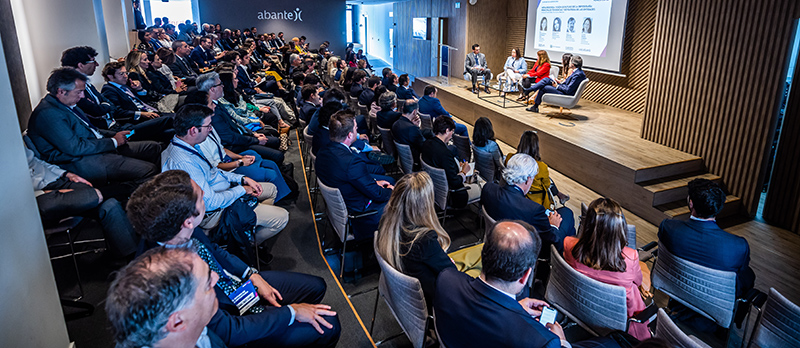
Digital assets, private markets and publicly promoted employment schemes are just a few examples of how the market is increasingly and rapidly incorporating new investment products and solutions. All of them demand new adaptations in the services offered by depositaries and this was discussed at length at the 3rd Conference on The Future of Depositaries, organised annually by FundsPeople in collaboration with the leading depositaries in Spain: BBVA, Securities Services BNP Paribas, Caceis and Cecabank. All of them spoke at a round table chaired by Francisco Béjar, CEO of Iberclear, about the challenges facing the sector.
"Regulatory and market changes force us to always be investing," explains Aurora Cuadros, Corporate Director of Securities Services at Cecabank. Most of these investments are going to stop technological developments that allow them to automate and be more efficient in their service models. "Only the increase in regulation has led to a continuous investment in systems seeking to automate processes by investing in Apis, Machine Learning, Reporting and everything without having a financial impact for customers", says Emma Urraca , sales for Spain and Portugal of Securities Services BNP Paribas.
The other side has more to do with investing in teams specialising in these new models and products that are emerging from the markets. Especially as these are clients who in many cases have never worked with a depository institution. "In the case of EPSVs or venture capital, these were vehicles that were not born with us and were obliged by regulation to have a depository. At first there was a lot of scepticism and we had to explain to them that the depository is not a custodian", explains María Dolores Domínguez Haro, head of BBVA's Depository Services. Not only that. They have also had to identify the specific needs of those particular customers in order to achieve the relationship of trust that should always prevail between a depository and its customers.
For her part, Aurora Cuadros highlighted the vital role that the depositories are playing in the implementation of the publicly promoted employment schemes driven by the current Government. "We are working with the Ministry's technical commission to develop this common digital platform. The role of the depository will be crucial on those plans; we enter the platform to provide that solidity and guarantee by being a gateway between the management company and the administration, curbing any errors that might occur in the transfer of data from the management company to the platform", she stated.
Investment in technology is key
As far as venture capital is concerned, although a priori the regulation might seem very similar to that of CIIs, the truth is that it has also required a lot of adaptation in the depository services. Alejandro de los Ojos, Director of Sales and Customer Relations at Caceis, gives some examples. 'We have had to implement many technological adaptations to include record keeping, registration of investments, or to analyse as valid digital assets that in many cases are based in distant markets'.
Although the tailwind may not be as favourable as in the past due to the change in monetary policy, the democratisation of these investments brought about by the Crea y Crece law, especially for private banking customers, "can continue to provide value, although with greater caution, prudence in terms of new launches and less fundrising", says Urraca.
Finally, we should not disregard that the recent approval of the MiCA Regulation, which regulates part of the digital assets market, will increase the number of entities offering their customers investment services in cryptocurrency, which, logically, also require custody and depositary services. José García Alcorta, Head of the General Regulation Division of the Banco de España's Regulation Department, gave an overview of these regulations.

